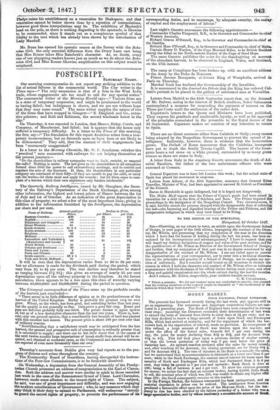POSTSCRIPT.
SATURDAY NIGHT.
Our morning contemporaries do not report any striking addition to the list of actual failures in the commercial world. The City writer in the Times says—" The only suspension is that of a firm in the West India trade, whose engagements are too small to call for any special notice." The commercial writer of the Morning Herald says—" Various firms are in a state of temporary suspension, and might be proclaimed to the world as having failed; but indulgence is shown, and we are not without hope that they may come round." The same writer supplies the names of two of the firms that have stopped in Glasgow—" R. Dalgleish and Co., exten- sive printers; and Reid and Robinson, the second wholesale house in the city."
On Thursday, it was reported in London, that Messrs. Birley, Corrie, and Company, of Manchester, had failed; but it appears that the house only suffered a temporary difficulty. In a letter to the Times of this morning, the firm say—" The foundation for this report doubtless arises from a tem- porary inconvenience, but no demands upon us have been or are likely to be dishonoured." They add, that the amount of their engagements has been "enormously exaggerated."
In a letter to the Morning Chronicle, Mr. W. F. Sparkman rebukes the "practical " men connected with railways for not helping themselves at the present juncture—
"Do the shareholders in railway companies want to limit, restrict, or suspend the calls? Nothing is easier. The law gives to the shareholders in all companies formed since 1845 the power to call extraordinary meetings, and to control and regulate the acts of the directors. If, then, the shareholders in any particular company are convinced of their folly—if they are unable to pay the calls, or carry out the works—let them meet and apply the remedy: but let them cease to com- plain of a burden which their own supineness only renders intolerable."
The Quarterly Railway Intelligence, issued by Mr. Slaughter, the Secre- tary of the Railway's Department of the Stock Exchange, gives, among other information, the highest' and lowest prices of Shares between the 1st of July and 1st of October. As an indication of the great depreciation in this class of property, we select a few of the most important lines; giving in addition to the information furnished by the Intelligence, the depreciation per share and per cent.
Amount paid per Decline in Price.
The Liverpool correspondent of the Times sums up the probable results of the harvest just concluded- ' There seems to be little difference of opinion as to the productiveness of the harvest of the United Kingdom. Barley is probably the greatest crop we ever grew. Wheat, on the whole, has been good, and something better than last year; but the quality is not generally so fine. Oats prove a good fair crop. Beans and peas are deficient probably fully one-third. The potato disease is again spoken of, but as of a less destructive character than the last two years. There is, how- ever, only one general opinion, that a considerably less breadth of land was planted with this esculent last season. The present price is about 100 per cent over that of ordinary seasons. " Notwithstanding that a satisfactory result may be anticipated from the late harvest, the present and prospective rate of consumption is evidently greater than it is calculated to supply; and there can be but little doubt that in the course of the next twelve months large importations of bread-stuffs from abroad will be re- quired, and obtained at moderate rates, as the Continental and American harvests are reported of even more favourably than our own." Name of Railway. Share.
Eastern Counties 420 Norfolk 100 Edinburgh and Glasgow 50
Great Western 85 South-western 41 6 8 North-western 100 Brighton 50 Midland 100 Lancashire and Yorkshire1 .2 (Manchester and Leeds) 5 ' North British 25 Orleans and Bordeaux 20 Paris and Lyons 8 Paris and Orleans 20 South-eastern 33 2 4 York and North Midland. • 50 -It will be seen that the depreciation varies from to 20 to 36 per cent; but no allowance is made for the dividends paid during the period, which vary from 2} to 4* per cent. The real decline may therefore be stated as ranging between 17i 31k: this gives an average of nearly 25 per cent depreciation upon all the railway property in the kingdom. At the lowest calculation, there appears to be a loss upon this class of security varying between 40,000,000/. and 50,000,0001. during the period in question.
per Share. per Cent.
44 214 25
25
18
36
21 241 10 25 25 25 13 26 21 21 21 251
8
32 4 20
2
25 4 20
61
201 15 30


























 Previous page
Previous page